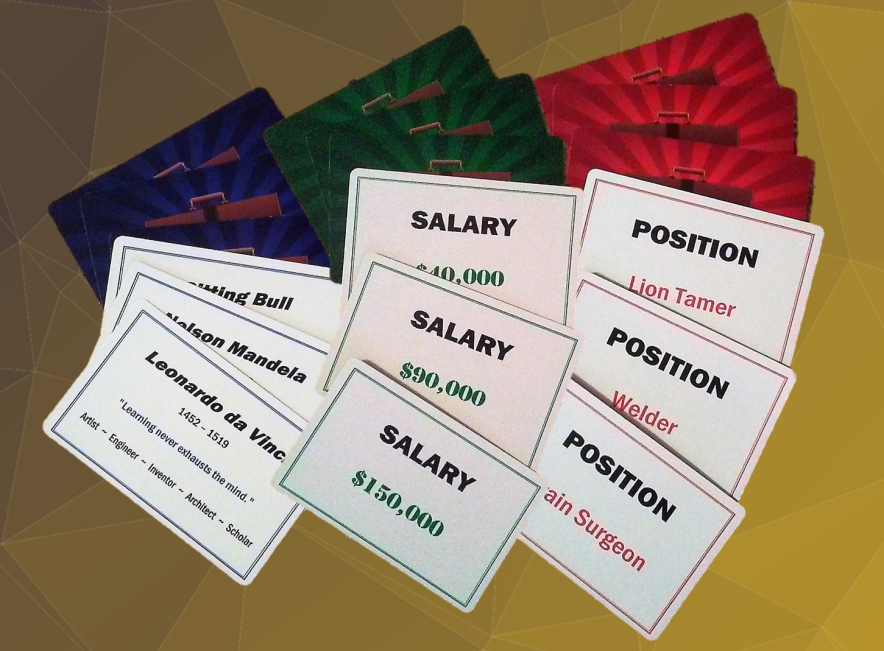Are you an avid “Apples to Apples” fan? Are you a history buff or at least, have a passing interest in historical figures from around the globe? Queue “Headhunter: Hilarious Hires from History”, a 4-10 player family/party game that takes roughly thirty to sixty minutes to play. Your main goal will be to hire clients like Abraham Lincoln and make some money in the process. Do you have what it takes to be the most profitable headhunter? Special thanks to CEO Michael (Austin) Rice for providing me with a prototype for preview purposes. It’s important to stress that prototypes are not reflective of the final product, making everything you see here (including the components and rules) subject to change. I’m also required by FCC regulations to disclose that this article was sponsored, though my opinions are my own.

My prototype came with about 160 cards and a four-sided die, however I’m told that the finished product will contain at least 200 cards and a six-sided die (1-2-2-3-3-4). The cards themselves come in three types: Candidate, Salary, and Position. The object is to be the first player to place $1,000,000 in salaries OR have the highest amount in salaries by the end of the game, whichever is first. As a headhunter, your job will be to get their candidates hired for job postings (positions) which hopefully have a high salary.
To set up the game, players will divide the cards into their respective types and shuffle each one separately. Each player then draws three candidate cards to form their starting hand. A die is rolled to determine who starts the game as “the employer”, a role that rotates around the table clockwise with every new hand. This type of role is very common in games like “Apples to Apples”, so if you’ve played that game before, you’ll be fine here.
Once established, the employer will draw a single position card, then roll the die to determine how many salary cards to draw (die value = number of salary cards). Once done, the employer posts the job by revealing the position and salary cards, placing them face-up for all to see. The rest of the players will then each submit a client to the employer from their hand, face-down. Once everyone has done so, the employer will mix them up so that they don’t know who submitted which client.

After the employer mixes up the client cards, they’ll lay them face-up for all to see, then assign them the previously drawn salary cards. Each player takes their earned salary card and places it into their personal scoring area. After two full rounds (each player has been the employer twice) the game will end and whoever has the highest summed salary score wins. If someone earns a hard one million before that happens then they automatically win. Used candidate cards are discarded and players refill their hand to three.
While there are no shortage of games like this on the market, it’s nice to see an “Apples to Apples” variation that is actually educational. The candidate cards goes as far as to include a birth/death year, a quote, and a summary of their actual titles/roles in history. Mark Twain is famous for saying a lot of things, but I had no idea that “Whenever you find yourself on the side of the majority, it is time to pause and reflect” was one of them. I enjoy little details like that in the games I play as these kinds of things can easily open the door to discussions that people may not have had otherwise.
The box states that the game is appropriate for ages 12+, though in my humble opinion younger children could partake and learn something in the process too! As I said above, the game does indeed have educational value so if your child asks who “Susan B. Anthony” is, you’ll be able to open the door to a hopefully attention-grabbing lesson. While not the game’s intended use, I’m sure these candidate cards could be used as flash cards in some sort of history lesson in school. Perhaps if the cards had more educational information on them they could be just that.

To make the game a bit more casual and friendly, I’d personally do away with the die and draw salary cards per turn equal to the number of players minus one (the employer). Why? I personally like the idea of everyone earning a salary card every turn. Normally, in games like “Apples to Apples”, there is one clear winner and they become the new judge. With this modified rule set, you won’t have that limitation here. Every player would get something and depending on the salary cards drawn, the setback could be extremely minor for coming in last. If the salaries available are $60k, $70k, and $80k in a four player game for example, the lowest earner will still come out feeling like a winner. Of course, that’s based on the salaries and how far apart they are from one another.
From what I’m told, there are plans to crowdfund this game via Kickstarter however no specific date has been chosen. As such, the game isn’t available for purchase (yet), but you can keep an eye out over on the official website for further updates. If you’re into print-and-plays however, you can download the files you need to start playing right away! And yes, the game encourages you to be as serious or as silly as your group pleases…I prefer the latter, but that’s completely up to you.
